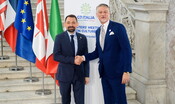“I thank you for being here to launch a political message to the world together: Culture is an essential public good of our societies and a value, a universal language, which speaks to everyone’s heart and contributes to dialogue between peoples”. These are the words of the Minister of Culture, Alessandro Giuli, in opening the proceedings of the G7 Culture, in the Royal Palace of Naples. “We live in an era marked by social lacerations, fundamentalist hatred, military conflicts that were thought to be memories of the past – he explains – we face new challenges dictated by the evolution of technology and climate change”. For this reason “Italy believes that, especially in this era, culture is a central pillar of civil coexistence, a formidable instrument of mutual understanding and comparison, an antidote to every form of discrimination and extremism, a formidable driving force of sustainable development”.
“A shared approach based on the values that unite the West, to find “effective and long-term” solutions on the “urgent” issues to be addressed in the two-day work of the G7 Culture, meeting in Naples, is what Giuli hopes for, who is chairing the ministerial meeting in Naples and underlines: “we must not fail this challenge”. “I believe it is necessary to agree on a shared approach to find effective and long-term solutions. I am convinced – says Giuli in his opening speech at the G7 Culture – that together we can find many of the answers we need starting from the principles and values that unite the West”.
The Italian Presidency wanted to host a G7 Culture, seven years after the first and only edition, in Florence in 2017. Today, says Giuli, we intend to discuss the most urgent issues that our cultural institutions are facing to find shared answers together, starting from the values and principles that unite us”. “Because – he underlines – what unites us is always greater than what can divide us” and cites “democracy, the rule of law, respect for freedom of expression and pluralism”. First topic on the table is “the defense of our cultural identities. Culture is the soul of a nation, it embodies its identity, its history, the values of its community. It is one of the most precious assets that a people has and it is imperative to protect it from the threats of our time”.
Support for Kiev
In his welcoming speech, Sangiuliano’s successor touched on many topics, including support for Ukraine.”We must continue to stand by the Ukrainian people in the defense of their sovereignty. We must help them protect their cultural heritage and assist them in the reconstruction work.” For this reason, the minister hoped that a “strong” message of support for Ukraine would be given. “At its core, there seems to be an attempt to erase Ukrainian cultural identity.“, he observed, “to destroy the signs of a Nation, which has demonstrated, with courage and determination, that it wants to choose its own future autonomously. We cannot allow this”.
“I hope that this G7 meeting will send out a strong and shared message for the protection of Ukrainian cultural identity” (Alessandro Giuli, Minister of Culture)
Giuli explains that, for all these reasons, he wanted his Ukrainian counterpart, Mykola Tochytskyi, to open the first session. “Mykola and his people have been defending themselves for over two years from an aggression, that of Putin’s Russia, wicked and criminal, which violates the principles of international law and brings the horror of military conflict back to Europe”, he added, “this war was launched to take away the freedom and democracy of the Ukrainian people, those rights that are the basis of our systems. It is causing death and unspeakable suffering to the population. It is also causing an indiscriminate attack on the Ukrainian cultural heritage”. Giuli then presented Tochytskyi with a medal for two years of “Ukrainian resistance” since the beginning of the war with Russia. The medal, made of bronze, has a diameter of 80 millimeters and was minted by the State Mint.
The implications of artificial intelligence
The use of artificial intelligence is the other macro-theme that finds citizenship in Giuli’s welcome speech. Its use “without rules raises many doubts”, warns the minister. “Our nations are leaders in this transformation and it is essential that the G7 finds convergence on the most appropriate tools and methods to govern the effects of artificial intelligence on cultural and creative industries”. “We believe that the development process of this technology must put the individual, his rights, his creativity at the center”, he explains, highlighting the “opportunities and challenges that the advent of artificial intelligence brings for culture and creativity”.
“We are experiencing a historic transformation: AI applications are opening up new horizons and producing indisputable benefits for the cultural system. Thanks to them, it is infinitely easier to decipher the content of ancient texts. Or to carry out investigative research on stolen works of art traded online. But – he underlines – there is no doubt that the unregulated use of artificial intelligence raises serious ethical questions and produces devastating impacts on the economic and social level”.

постільна білизна
постільна білизна
Постельное белье
постільна білизна
Постельное белье
Постельное белье
Постельное белье
Постельное белье
постельное белье
Постельное белье
503 Service Temporarily Unavailable
503 Service Temporarily Unavailable
полезные советы
Постільна білизна
постільна білизна
503 Service Temporarily Unavailable
503 Service Temporarily Unavailable
покривало | Ukraine Forum – для легкого та спокійного спілкування…
ковдра
Ковдра
одеяло
Certificate verification problem detected
одеяло
Certificate verification problem detected
Постельное белье – найди ответ на Getrejoin.com!
Постельное белье – Форум города Днепр (Днепропетровска)